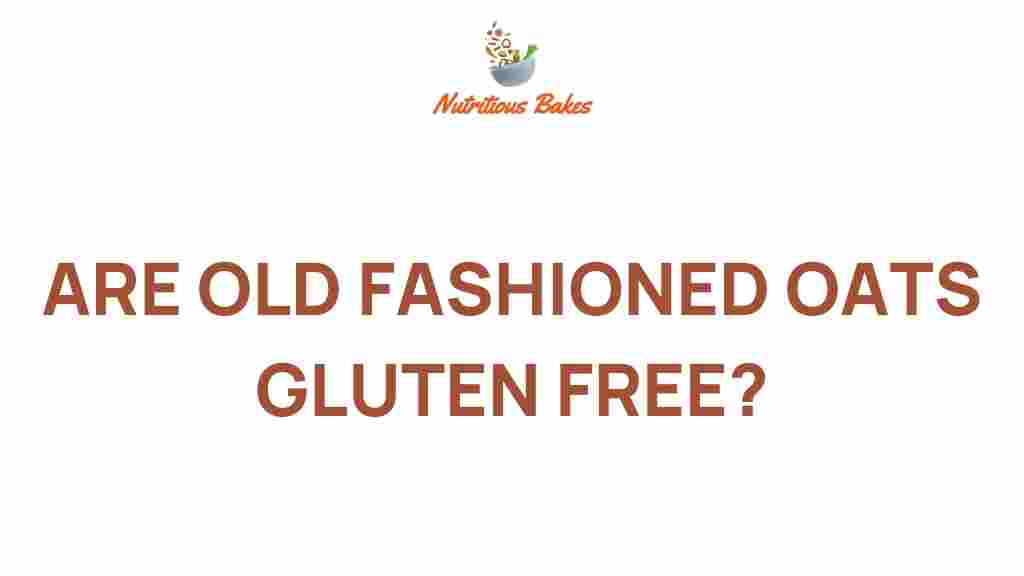Are Old Fashioned Oats Truly Gluten Free?
In recent years, the popularity of oats has surged, particularly among health-conscious individuals and those exploring gluten-free dietary choices. Old fashioned oats, in particular, have become a staple in many kitchens. They are often praised for their nutritional benefits and versatility in various recipes. But a significant question arises: Are old fashioned oats truly gluten free? In this article, we will delve into the complexities surrounding oats, gluten, and food safety to unveil the truth about this popular grain.
Understanding Gluten and Its Impact on Health
Gluten is a protein found in several grains, including wheat, barley, and rye. For individuals with celiac disease or gluten sensitivity, consuming gluten can lead to severe health issues, including digestive problems, fatigue, and other systemic symptoms. As such, the demand for gluten-free options has increased, with many people turning to oats as a potential alternative.
What Are Old Fashioned Oats?
Old fashioned oats, also known as rolled oats, are made by steaming and rolling whole oat groats. This process helps to flatten the oats and allows them to cook more quickly than steel-cut oats. They are a popular choice for oatmeal, granola, and baking due to their chewy texture and nutty flavor.
The Gluten-Free Status of Old Fashioned Oats
While oats are inherently gluten-free, the primary concern arises from contamination during processing and packaging. Here are the key points to consider:
- Cross-Contamination: Oats are often processed in facilities that also handle gluten-containing grains. This can lead to cross-contamination, making the oats unsafe for those with gluten intolerance.
- Certified Gluten-Free Oats: To ensure safety, look for oats that are labeled as “certified gluten-free.” These oats are grown, harvested, and processed in dedicated facilities to prevent contamination.
- Understanding Labels: Always read the labels carefully. Just because oats are labeled “old fashioned” does not guarantee they are gluten-free.
Nutritional Benefits of Old Fashioned Oats
Old fashioned oats are not only delicious but also packed with numerous health benefits:
- Rich in Fiber: Oats are an excellent source of dietary fiber, particularly beta-glucan, which can help lower cholesterol levels and improve heart health.
- High in Nutrients: Oats are rich in essential vitamins and minerals, including manganese, phosphorus, magnesium, copper, iron, zinc, and B vitamins.
- Weight Management: The fiber content in oats promotes satiety, helping to control appetite and support weight management.
- Blood Sugar Control: The low glycemic index of oats makes them a suitable choice for individuals looking to manage blood sugar levels.
How to Incorporate Old Fashioned Oats into Your Diet
Adding old fashioned oats to your meals can be easy and delicious. Here are some ideas:
- Breakfast Oatmeal: Cook oats with water or milk and top with fruits, nuts, and a drizzle of honey for a nutritious breakfast.
- Overnight Oats: Combine oats with yogurt or milk and let them soak overnight for a quick, portable breakfast option.
- Baking: Use old fashioned oats in cookies, granola bars, or muffins to increase fiber content.
- Smoothies: Blend oats into smoothies for added texture and nutrition.
Food Safety and Oats
When considering dietary choices, food safety is paramount. Here are some important tips to ensure you are consuming oats safely:
- Choose Certified Products: Always opt for certified gluten-free old fashioned oats if you have gluten sensitivity.
- Store Properly: Keep oats in a cool, dry place in an airtight container to prevent spoilage and contamination.
- Monitor Reactions: If you are new to incorporating oats into your diet, start with small portions and monitor any adverse reactions.
Troubleshooting Common Issues with Old Fashioned Oats
Many people may face challenges when incorporating old fashioned oats into their diets. Here are some common issues and how to address them:
- Texture Issues: If you find your oats too chewy, try cooking them for a longer time or soaking overnight to soften them.
- Flavor Preferences: If the taste of plain oats is unappealing, add spices such as cinnamon or vanilla extract to enhance flavor.
- Digestive Discomfort: If you experience bloating or discomfort after eating oats, consider reducing portion sizes or gradually increasing your intake to allow your body to adjust.
Conclusion: The Bottom Line on Old Fashioned Oats and Gluten Free
In conclusion, old fashioned oats can be a nutritious and versatile addition to a gluten-free diet, provided you choose certified gluten-free varieties. They offer numerous health benefits, including high fiber content and essential nutrients, making them an excellent choice for those looking to enhance their nutrition. By being mindful of food safety, understanding potential cross-contamination, and incorporating oats thoughtfully into your meals, you can enjoy the many advantages they offer without compromising your dietary choices.
For more information on gluten-free grains and healthy eating, check out this comprehensive guide. Remember to prioritize your health and choose the best options for your dietary needs.
If you want to learn more about the nutritional benefits of grains, visit this nutrition resource for further insights.
This article is in the category Ingredients and created by NutritiousBakes Team
